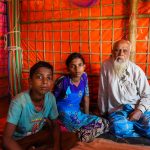On November 11, the Gambia filed a 1948 Genocide Convention violation complaint against Myanmar with the International Court of Justice (ICJ), a decisive step toward justice for the Rohingya.
Canada’s minister of foreign affairs, Chrystia Freeland, declared that Canada “welcomes” the Gambia’s move, but omitted that the Canadian government could and should have taken the international lead in taking Myanmar to the ICJ months ago. Canada’s failure to do so is notable, given its prominent role in demanding accountability for the atrocities that Myanmar’s security forces inflicted on its Muslim Rohingya minority in late 2017 in northern Rakhine state.
The scale and barbarity of those abuses are unquestionable. In September 2018, the United Nations Fact-Finding Mission (FFM) published a 444-page report about human rights abuses against the Rohingya. The mission’s report concluded that there was evidence of atrocities – including mass killings, gang rapes, and mutilations – warranting criminal prosecution for crimes against humanity, war crimes, and genocide. The report names top military officials as targets for investigation and prosecution and blames civilian authorities for “spreading false narratives, denying the wrongdoing of the (security forces), blocking independent investigations … and overseeing the destruction of evidence.”
Investigations by Physicians for Human Rights over the past two years have put a tragic human face to the UN assessment, and provided scientific objectivity in refuting the government’s repeated denials. In 2018, PHR surveyed 604 leaders from Rohingya hamlets in Rakhine state encompassing more than 916,000 people. The findings, coupled with in-depth interviews and forensic medical examinations of Rohingya survivors, point to a widespread and systematic pattern of targeted violence – including rapes and killings of women, men, and children.
Despite that evidence, the Myanmar government has consistently stonewalled international efforts at accountability for those atrocities. The government rejected the UN FFM report’s findings as “false allegations.” The government has also blocked UN Special Rapporteur on Myanmar Yanghee Lee, who is tasked with assessing the human rights situation in that country.
But there are promising signs that international accountability efforts for the Rohingya are moving forward despite Myanmar’s intransigence. On Nov 13, Rohingya and Latin American human rights organizations filed a case with an Argentine court against Myanmar government and military officials under the concept of universal jurisdiction, which allows that people implicated in the most serious international crimes may be arrested, prosecuted and convicted in countries other than their own. The Argentine court filing seeks “the criminal sanction of the perpetrators, accomplices and cover-ups of the genocide” perpetrated by Myanmar security forces against the Rohingya.
The very next day, the International Criminal Court (ICC) announced that it had authorized a formal investigation into Myanmar government abuses against the Rohingya in late 2017 based on an acceptance that “widespread and/or systematic acts of violence may have been committed that could qualify as the crimes against humanity of deportation across the Myanmar-Bangladesh border and persecution on grounds of ethnicity and/or religion against the Rohingya population.” Prior efforts to initiate an ICC investigation of the bloodshed have been complicated by the fact that Myanmar is not a signatory to the Rome Statute that established the court. International efforts to trigger an ICC probe via a resolution of the UN Security Council have been stymied by the opposition of Russia and China. Meanwhile, the UN-created Independent Investigative Mechanism for Myanmar (IIMM) officially began operations in September 2019 to probe whether Myanmar has committed crimes against humanity against its ethnic minorities over the past eight years.
Canada deserves credit for initially spearheading international efforts to demand accountability for those outrages. In October 2017, Prime Minister Justin Trudeau created the position of Special Envoy to Myanmar to lead accountability efforts. Following the September 2018 release of the damning UN report that implicated the Myanmar military in crimes against humanity and acts of “genocidal intent,” Canada’s parliament became the world’s first to vote unanimously that the Rohingya were the victims of a genocide and to urge prosecution of senior Myanmar military officials implicated in that crime. Canada’s senate echoed that determination a month later and also withdrew honorary citizenship to Myanmar’s civilian leader, Aung San Suu Kyi, for being “complicit” in the anti-Rohingya violence.
The Canadian government should bridge the gap between its Rohingya justice rhetoric and the reality. It can do so by supporting Gambia’s ICJ complaint against Myanmar for violation of the 1948 Genocide Convention through whatever means possible. That can include joining Gambia’s complaint if Gambia seeks that support. By doing so, Canada can signal to Myanmar the Canadian government’s resolve to seek accountability for allegations of genocide and pursue reparations for Myanmar’s atrocities against the Rohingya. The Canadian government should also impose individual sanctions, including travel bans and asset freezes, against Myanmar government and military officials – and their family members – implicated in the 2017 targeted violence against the Rohingya.
On November 11, Canada’s Minister Freeland stated that the government “will explore options to support the Gambia in these [accountability] efforts.” Until Freeland demonstrates that Canada has the political will to act on that commitment, the Rohingya have good reason to be skeptical of Canada’s commitment to justice and accountability.

